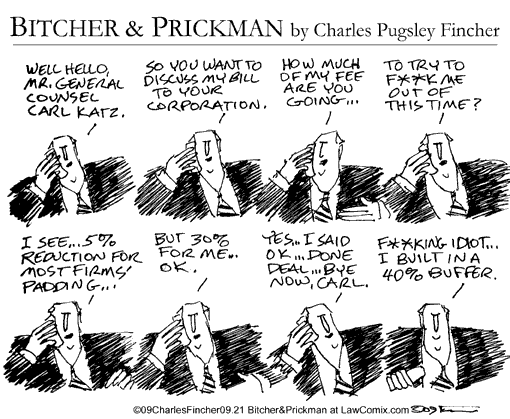
|
http://www.patrickmckenna.com/blog
Page << Prev 50 51 52 53 54 55 56 57 58 59 Next >> of 95
Post #421 – Thursday, October 29, 2009
Time To Review Your Strategy
I'm finally back at home base, having worked in 8 countries, across 3 continents during these past two months. What remains consistent across those diverse geographies is that firms everywhere are in need of a new strategy for growth. Firm leaders are recognizing, as they catch their breathe after months of turbulence,  that the strategy they were pursuing is unlikely to take them where they need to go. Indeed, conventional approaches to developing strategic plan in law firms – those lengthy protracted internal debates that lead to developing monumental documents detailing the firms direction over the coming three to five-years – seems to now belong to a bygone era. that the strategy they were pursuing is unlikely to take them where they need to go. Indeed, conventional approaches to developing strategic plan in law firms – those lengthy protracted internal debates that lead to developing monumental documents detailing the firms direction over the coming three to five-years – seems to now belong to a bygone era.
So, what are leading firms doing today to advance setting their strategic direction? Unsurprisingly, they are holding their current strategic plans in abeyance while they explore how they might need to adapt to trends that portend changes in their fundamental business models, while also figuring out how to navigate their way through a coming period of economic uncertainty.
Put slightly differently, the executive committees of more firms are beginning to engage in an Adaptive Strategy Review – scheduling a couple of days to discuss and explore what new trends, developments and issues (signals) will potentially impact their firm going forward and what actions they need to take NOW! In one of my most recent review sessions our singular agenda topic was: “What will our legal profession look like in the year 2012 and what should we be starting to do now to get to the future first?”
The process for strategic planning has changed. Your strategy needs to be constantly evolving. While the eternal truths – about determining your target markets and how you reach them, what specific practices may be evolving that you need to be in, the value promise that leads clients to choose you, hard-to-copy advantages that help you differentiate your firm; and how your resources are aligned – endure; however, a more dynamic and adaptive approach is now needed. Managing Partners need to be more flexible, resilient and ready to make necessary adjustments and changes.
The approach to law firm strategy taught by business schools, promoted by the big consultancies and practiced by most firms is relentlessly 'left brain' - it's focused almost exclusively on 'the numbers' and data analysis, and on formal, detailed plans, with strategy sessions the exclusive preserve of a few senior partners.
Great strategies aren't the product of rational analysis alone - they emerge when a committed team puts its 'whole mind' to work, approaching strategy making creatively and collaboratively - to stimulate 'strategic intuition' and insight, and build buy-in and belief amongst the teams that must make the strategy happen. Great process isn't just about building the flexibility needed to change direction at the drop of a hat, it's about bringing in 'new voices' and different perspectives into the strategy process - encouraging those who are prepared to challenge the profession’s status quo.
Reinventing the strategy process isn't a 'nice to do', it is a 'must do' - and every real improvement will feed directly through to your firm’s bottom line.
Post #420 – Wednesday, October 14, 2009
The Disruptive But Inevitable Move to Alternative Fees
 The past two months have evidenced a four-part series of articles being written on the subject of alternative fee arrangements and co-authored by a Fortune 500 GC (Jeffrey Carr of FMC Technologies), a Managing Partner (Edwin Reeser), a leading practitioner in alternative fee arrangements (Pat Lamb), and a management consultant (yours truly). The first of these articles had over 700 hits for web reads in only a couple of hours following release. The past two months have evidenced a four-part series of articles being written on the subject of alternative fee arrangements and co-authored by a Fortune 500 GC (Jeffrey Carr of FMC Technologies), a Managing Partner (Edwin Reeser), a leading practitioner in alternative fee arrangements (Pat Lamb), and a management consultant (yours truly). The first of these articles had over 700 hits for web reads in only a couple of hours following release.
All four of these articles have now been published, many appearing on the front page of the Los Angeles Daily Journal, and all currently appearing on Legal OnRamp.
Download and read – The Disruptive But Inevitable Move to Alternative Fees 
This series will now be included as reading materials at the American Lawyer Law Firm Management Forum: The Future of the Business of Law seminar at New York’s Harvard Club on October 27 and 28; as handouts during the Annual Meeting Session on the ACC Value Challenge; and as participant materials in the Ark seminars scheduled in November on law practice management and alternative fee arrangements. These articles are also scheduled to be re-published in the Australasian Law Management Journal.
Post #419 – Wednesday, October 14, 2009
Somewhat Conflicting Views
At Legal Week’s annual European Corporate Counsel Forum, Peter Kurer the retired chairman of Swiss investment bank UBS shared some insightful comments comparing the differences between lawyers and business people:
 • Business people are closure-minded. In contrast, lawyers are perfectionists who are happy to delay a process for relatively minute details. • Business people are closure-minded. In contrast, lawyers are perfectionists who are happy to delay a process for relatively minute details.
• Business people live on reducing complexity. Lawyers, on the other hand, like to increase it.
• Business people concentrate on opportunities; lawyers on making barriers to opportunities.
• Business people are proactive, defining the agenda. Lawyers react.
• Business people want certainty on the future. Lawyers often can't deliver on that.
• Business people think in cycles; lawyers much less so because we all know our trade is OK in good and bad times.
• Lawyers are extremely rational and value intellectual honesty. Business people think emotion - and emotional intelligence - is important, too.
• Business people build trust. Lawyers are a source of this trust.
• Lawyers are cynical. Business people can't stand cynicism: it hinders the movement of an organization forward.
• Business people think lawyers are boring. By talking and talking, lawyers reinforce this belief.
Post #418 – Wednesday, October 14, 2009
Commercial Real Estate – The Next Calamity
In my article: 'Managing Through A Prolonged Downturn’ written over 14 months ago, I warned . . .
Get ready for the next real estate disaster. The enormous cutback in spending by consumers will reverberate throughout the economy. Thousands of retailers and restaurants that expanded based on debt-aided demand will be going out of business. So, if you are sick of hearing about residential mortgage problems, there is yet another potential real  estate crisis on the horizon – in Commercial property. estate crisis on the horizon – in Commercial property.
Well, it’s happening!
Moody's Investors Service says the value of U.S. commercial real estate has fallen from the 2007 peak by an average of 35%, more than the residential property average. At the same time, these landlords' tenants are in trouble and so are their lenders. This stalled ripple effect is starting to accelerate: Tenants are going bust; some move out in the middle of the night; existing tenants demand concessions and others pay lower rent and also consolidate into smaller space. This is the logical outcome when consumer spending disappears and retailers and manufacturers are hurt or disappear.
Meanwhile, reports are that Tarp 2 is being designed to backstop the smaller, regional banks that are more commonly in commercial property lending. The banks that are 30th to 100th in size in the United States have a 12% average exposure to commercial property. There are US$3.7-trillion in outstanding commercial real estate-backed loans. Some US$400-billion will reach maturity by the end of 2009 and accelerate to US$2-trillion in 2010 and 2011.
The worst-case scenario will be that the jobless recovery lasts more than two years, consumer spending remains lackluster and bank losses on these properties trigger another financial crisis.
Post #417 – Wednesday, October 14, 2009
Ethical Leadership Models
I received a flattering note from Professor Neil Hamilton, Professor of Law and Director of the Thomas Hollaran Center for Ethical Leadership in the Professions. Professor Hamilton has just published his newest research in the University of St. Thomas Law Journal, a lengthy dissertation entitled Ethical Leadership In Professional Life. In this paper Neil analyzes various leadership theories and their effectiveness for the profession.
I am appreciative both for Neil’s kindness in sending me a copy of his published paper, but also for his repeated citing the content contained within First Among Equals as an example of an ‘ethical leadership model most useful for the roles that lawyers assume.’
Post #416 – Tuesday, October 6, 2009
The Latest Issue of International Review Is Available
The Fall 2009 issue of my International Review magazine has been out for a couple of weeks now and has generated a number of unsolicited e-mails:
I loved your last magazine issue.
Bruce Marcus, editor of The Marcus Letter
Our Executive Committee was intrigued by your insightful and inspiring article "It's Time to Think Differently about Law Firm Strategy"
James Hale, ARNALL GOLDEN
Patrick, Just reading thru your International Review, Fall 2009. Wonderful. Excellent. Well done, informative, helpful, insightful. Thank you for sending it along.
Bruce Christensen, WARNER NORCROSS
This issue included a number of articles on law firm management and strategy:
 • It's Time To Think Different About Law Firm Strategy • It's Time To Think Different About Law Firm Strategy
What I’ve learned is that the best performers are taking an entirely different approach to the strategy process and an approach that is based on some fundamentally different principles.
• Passion, People & Principles
Effective management in professional firms requires that you know how to deal with stress, proactively manage underperformers and screen new candidates for their character, not just their talent.
• Keeping Morale Up In A Downturn: Notes From The Lab
The lab was formed to provide pragmatic advice to assist new managing partners with their critical burning issues and help them succeed. Here is one of the latest questions and responses.
• A New Trend In Leasehold Liability
The collateral damage of a single BigLaw firm triggering losses approaching perhaps eight figures will result in serious rethinking of the approach that all building owners take to making lease deals.
• Entering Emerging Markets: Alternatives And Considerations
Asia and other emerging economies are proving attractive destinations for law firms from North America but how you reach that destination has a major impact on the potential benefit.
• Law Firm Leadership Reflections: Practical Advice For The Managing Partner
Excerpted from my blog, here are a selection of short snippets for reflecting on your leadership style, determining what your practice leaders should do and whether you should select your successor.
Meanwhile, my Hong Kong-based partner, Robert Sawhney had a version of his “Entering Emerging Markets” article featured on LawDragon.com. Kudos Bob! Here is a copy of his expanded version.
Post #415 - Tuesday, September 29, 2009
Everyone Loves Fixed Fees
 There is a great piece in today’s Legal BisNow entitled: Is the Fix In? – referring to fixed fees and reporting on a breakfast meeting this past Friday in Washington DC. Some of the more interesting commentary included: There is a great piece in today’s Legal BisNow entitled: Is the Fix In? – referring to fixed fees and reporting on a breakfast meeting this past Friday in Washington DC. Some of the more interesting commentary included:
• CitiGroup General Counsel Mike Helfer says “alternative fees” already account for about 30% of the arrangements they make, mainly fixed and contingency fees, although he joked that if you define it as "not paying rack rates," it’s 99.8%. Mike said two factors more important than hourly rates are “how we manage outside counsel” and a “sensible risk-reward ratio”— the rest, he said, is “background music.”
• Skadden Chairman Eric Friedman says Skadden believes in communication and partnership with clients and that saving money can be a win-win, even though it may have to adjust. As the largest employer of US based lawyers, he says they’re often looked to for how they handle things. Their “sidebar plus program” invited associates to take furloughs, which enabled an 8% reduction in their legal force. The deal provided 1/3 base salary, health benefits, a stipend to pay off law school debt, and the opportunity to remain productive.
• Akin Gump Chairman Bruce McLean predicts more and more will be done on alternative fee basis, because that's what he says clients want, and law firms are in the client service business. He believes this will lead to changes in the law firm business model as demand for work from the bottom of the pyramid declines. He says they’ll adjust staffing structures and costs to maintain profitability.
• Kirkland & Ellis Chairman Tom Yannucci says that the future is more contract lawyers, more outsourcing, and fewer full-time employees. Maybe even less legal work altogether. He says that the central business question coming out of the recession is: How can law firms become more efficient? Tom says the answer lies in: technology, the number of attorneys assigned to a matter, lawyering about core issues rather than peripherals, and speed in resolving issues. Everyone wants an instant answer in the electronic age, he says, and law firms have to provide them, even if they’re not footnoted quite as much.
Post # 414 – Thursday, September 24, 2009
Life After Being Managing Partner
 Legal Week featured a discussion with Ex-Linklaters head Tony Angel talking about life after being a managing partner. Tony served for 10 years in the managerial hot seat at Linklaters, during which time he correctly assessed that the legal market was on the cusp of revolution and helped transform the firm into a global force, before handing the reins over to Simon Davies early last year. Tony has now taken up a new role as executive managing director of credit rating agency Standard & Poor's (S&P). Legal Week featured a discussion with Ex-Linklaters head Tony Angel talking about life after being a managing partner. Tony served for 10 years in the managerial hot seat at Linklaters, during which time he correctly assessed that the legal market was on the cusp of revolution and helped transform the firm into a global force, before handing the reins over to Simon Davies early last year. Tony has now taken up a new role as executive managing director of credit rating agency Standard & Poor's (S&P).
Tony is one of those few law firm leaders to take a prominent executive role in industry after his tenure. A couple of Tony’s comments, in particular, resonated with me:
• It is not all that easy for retiring law firm leaders - even successful, high-profile ones - to land senior executive roles outside the law.
It is interesting how so few lawyers move into directorship positions elsewhere, observes the 57-year-old. Part of it is that we are not great at self-promotion, plus there is the stereotype of us being problem-focused rather than solution-focused.
• Tony believes law firms have evolved so far in business terms during the last decade that the reluctance to appoint ex-lawyers to non-legal management positions will soften.
What we are seeing is a lag, with the market being slow to recognize some of the skills that lawyers in global firms have built up, he adds. But maybe our time is about to come, particularly with the current premium on risk management.
Add a couple of comments from Tony’s peers:
There are a number of options for lawyers at the end of their private practice careers: senior in-house roles, a portfolio of non-executive positions or, of course, the full-time non-legal route chosen by Tony. And I think it's excellent that he will offer rigor, discipline and objectivity to a leading credit agency that, like its competitors, has taken a beating for its lack of forewarning of the credit crisis.
Vanni Treves, chairman of Korn/Ferry, Intertek, Equitable Life and the National College for School Leadership, (former senior partner of Macfarlanes)
When you've highly successfully run and transformed a global business of the size of Linklaters, you're more than capable of doing the same with other non-legal global businesses, without any doubt at all. And Tony - who I hear has set about the task at S&P with exactly the same ability and enthusiasm as he showed at Links - proves that point.
Nigel Knowles, joint CEO and managing partner of DLA Piper
Post #413 – Thursday, September 24, 2009
How Not To Approach Alternative Billing
I don’t know how I missed this before . . .
While doing some research this past week I happened across a law comics web site that is worth noting. Have a look at lawcomix.com and the hilarious work of Texan cartoonist Charles Pugsley Fincher, J.D.

It is insanely great!
Post #412 - Monday, September 21, 2009
Your Next Move
I received this generous note today from Mike Watkins, author of The First 90 Days:
 Patrick, I am delighted to let you know Harvard Business School Publishing is just about to release my new book, Your Next Move: The Leader's Guide to Navigating Major Career Transitions. The book extends the work of my previous bestseller, The First 90 Days, by focusing on the eight major transitions that executives experience during their careers -- including leading former peers, on-boarding, an international move, a re-alignment, and a turnaround challenge. I am sending you an early copy of the book. I have also just launched my new website, www.MichaelDWatkins.com, which provides information on my work. Be sure to check it out. Patrick, I am delighted to let you know Harvard Business School Publishing is just about to release my new book, Your Next Move: The Leader's Guide to Navigating Major Career Transitions. The book extends the work of my previous bestseller, The First 90 Days, by focusing on the eight major transitions that executives experience during their careers -- including leading former peers, on-boarding, an international move, a re-alignment, and a turnaround challenge. I am sending you an early copy of the book. I have also just launched my new website, www.MichaelDWatkins.com, which provides information on my work. Be sure to check it out.
Given my concurrent passion and intensive bi-annual program for new managing partners, Mike just knows that I will (jealously) consume his new book as soon as it arrives.
Page << Prev 50 51 52 53 54 55 56 57 58 59 Next >> of 95
|
|


 Ashridge House
Ashridge House  11226 - 60 Street
11226 - 60 Street  Edmonton, Canada
Edmonton, Canada  T5W 3Y8
T5W 3Y8